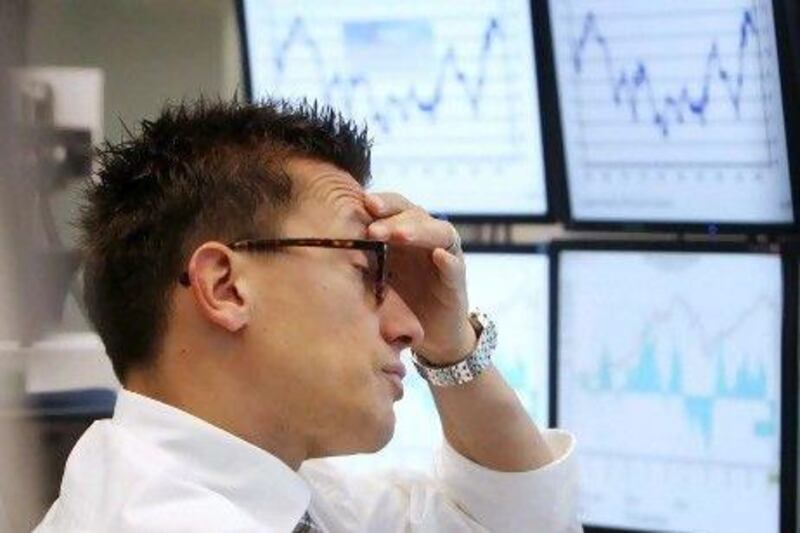Global markets dived to their lowest level in a year yesterday, raising the stakes ahead of talks by finance chiefs in Washington.
A delegation led by Obaid Humaid Al Tayer, the Minister of State for Financial Affairs, will put forward the UAE's view on the global economy at the meetings this weekend of the Group of 20 leading and emerging economies, the IMF and World Bank.
Setting the tone for what is likely to be the most closely watched annual gathering since the global financial crisis in 2008, Timothy Geithner, the US Treasury secretary, yesterday spelled out the biggest threats to the global economy.
"The two clouds still over us are the European crisis and the deep concerns that you can see across the world and around the country about whether the political system in the United States is up to the challenges we face," he said in the US capital.
Underlining the need for the world's financial leaders to take decisive action, global equities fell sharply.
World stocks, as measured by MSCI, dropped almost 3.9 per cent during in early US trading. The index has now dropped more than 14 per cent this year. The emerging market stock index dropped 5.57 per cent yesterday, contributing to a 22 per cent loss this year.
In Europe, the Stoxx Europe 600 was 4.54 per cent down at 215.09 during afternoon trading. The MSCI Asia Pacific Index earlier dipped 3.7 per cent to 113.52.
Investor confidence had been rocked by an unexpectedly gloomy assessment of the US economy by the Federal Reserve on Wednesday.
It highlighted "serious downside risks" facing the US economy.
The negative sentiment dampened market enthusiasm for the central bank's launch of "Operation Twist". The plan is aimed at lowering borrowing costs by selling shorter-dated debt and raising its share of longer-term treasuries by US$400 billion (Dh1.46 trillion) by June.
Some investors had been holding out for a third round of monetary stimulus, known as quantitative easing.
"The markets are focusing on the negative tone of the Fed's words. The other side of the coin to Operation Twist is what's happening in Europe," said Turker Hamzaoglu, an economist for Eastern Europe, Middle East and Africa at Bank of America Merrill Lynch.
More glum news emerged from the euro zone yesterday. Data showed business activity in Germany accelerated at its slowest rate in more than two years this month. New orders also fell for a third month.
The equity sell-off also reflected doubts about whether Greece would be able to deliver billions of euros of cuts pledged by politicians on Wednesday.
Evangelos Venizelos, the Greek finance minister, is likely to be grilled on the country's latest austerity measures when he participates in discussions in an Institute of International Finance conference in Washington on Sunday. Private-sector workers have already threatened to strike over the cuts, required for Greece to receive its latest €8bn of financial aid next month. Yesterday, public transport workers went on a 24-hour strike over the measures, crippling train, bus and taxi services. Air traffic controllers were also due to stop work for several hours.
Fears the troubles of the euro zone and the US may be infecting other parts of the world re-emerged yesterday. HSBC's purchasing managers index data showed China's factory sector declined for the third month in a row, indicating slowing growth.
Attention will now shift to this weekend's meetings for clues about whether policymakers can lift the uncertainties surrounding the global economy.
Mr Al Tayer is due to present a speech to the IMF's international monetary and financial committee on the world monetary system, the status of financial markets and credit risks.
The UAE aimed "to positively contribute to decisions made regarding the global economy and economic developments mechanisms," he said.





